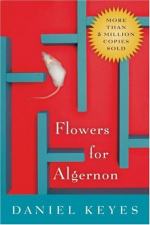|
|
Flowers for Algernon Notes & Analysis
The free Flowers for Algernon notes include comprehensive information and analysis to help you understand the book. These free notes consist of about 42 pages (12,498 words) and contain the following sections:
These free notes also contain Quotes and Themes & Topics on Flowers for Algernon by Daniel Keyes.
Flowers for Algernon Plot Summary
Narrated through a series of first-hand progress reports, Flowers for Algernon traces the mental and emotional development of Charlie Gordon, a retarded young man who becomes the first human test-subject for an ambitious brain experiment. Author Daniel Keyes stylistically portrays Charlie's startling progress and eventual decline through the ever-changing sentence structure, spelling, and vocabulary of Charlie's journal entries.
Charlie begins his report on March third, expressing hope that Dr. Strauss and Professor Nemur will choose him for an operation capable of raising his IQ to that of an intellectual superman. Miss Kinnian, Charlie's reading teacher at the Beekman College Center for Retarded Adults, recommended him for the experimental surgery. Charlie is good-natured and hard-working, and he wants more than anything "to be smart."
Impressed by Charlie's motivation, Dr. Strauss and Professor Nemur decide to use Charlie in the experiment. At the laboratory, Charlie undergoes inkblot personality tests administered by graduate student Burt Selden. He also runs mazes against Algernon, a super-smart white mouse. Algernon is the first animal to have retained his artificially increased intelligence through Nemur and Strauss' experiment. After surgery, the doctors give Charlie a strange teaching machine. The odd television set repeats words throughout the night, implanting knowledge and stimulating memories as Charlie sleeps.
Progress is very slow at first, but soon Charlie beats Algernon at the mazes and gets a promotion at Donner's Bakery, where he works. He also learns spelling and punctuation, becomes interested in philosophy, politics, and the symphony. Soon he moves on to advanced calculus and ancient languages. Charlie reads and comprehends everything he lays his hands on; he has become a genius. This intellectual boom is not completely positive, however. With his new awareness comes the realization that many of his so-called friends have mocked him all his life. Vivid memories of childhood abuse remind Charlie that even his own mother was ashamed of him.
Charlie falls in love with Alice Kinnian, his old reading teacher, but he panics whenever he contemplates intimacy. During therapy, Dr. Strauss explains that Charlie is sexually immature and not yet ready for a relationship. Lonely and depressed by vivid dreams and painful memories of his family, Charlie stops trusting people. He becomes an arrogant "big-shot." Though a genius, Dr. Strauss believes that Charlie remains emotionally retarded. Charlie's breaking point comes at the International Psychological Convention in Chicago when Professor Nemur treats Charlie like an inanimate test subject. The angered genius disrupts the convention, steals Algernon from his cage and flies back to New York alone.
At the peak of his intellectual powers, Charlie realizes that there is a flaw in Nemur's experimental calculations. In a report entitled The Algernon-Gordon Effect: A Study of Structure and Function of Increased Intelligence, Charlie explains that "Artificially-induced intelligence deteriorates at a rate of time directly proportional to the quantity of the increase." Algernon becomes erratic and dies. Devastated, Charlie realizes that his own mental deterioration is inevitable. With his remaining time, Charlie visits his family and has a tender love affair with Alice. Tragically, Charlie's regression proves nearly complete. Unable to bear everyone's pity, Charlie plans to go away to the Warren State Home and Training School. He closes his progress report on November 21st, urging everyone not to feel guilty and reminding his friends to lay some flowers on Algernon's small backyard grave.




